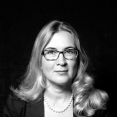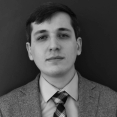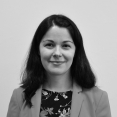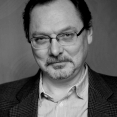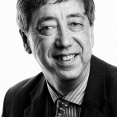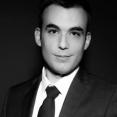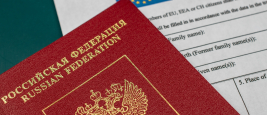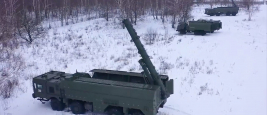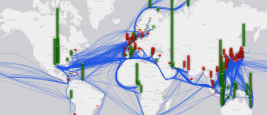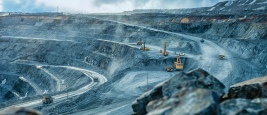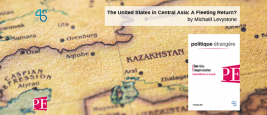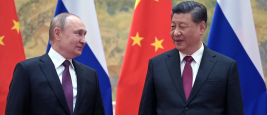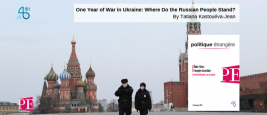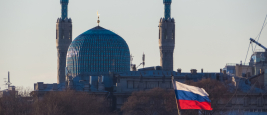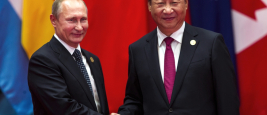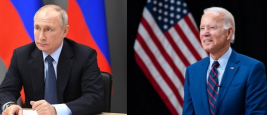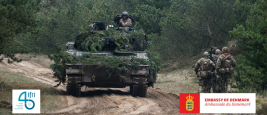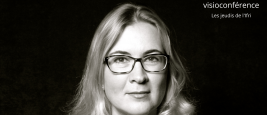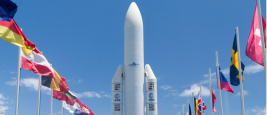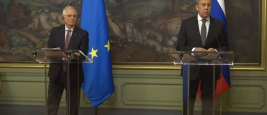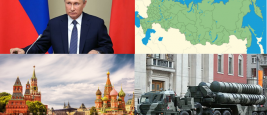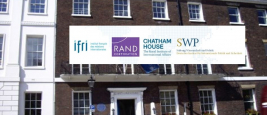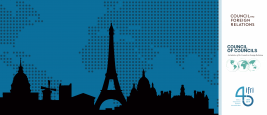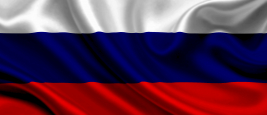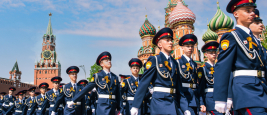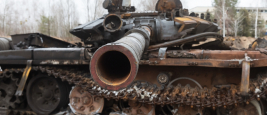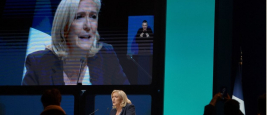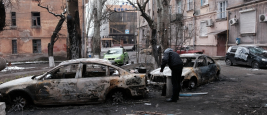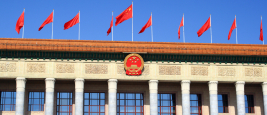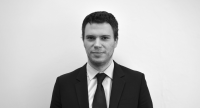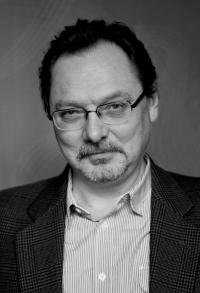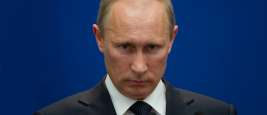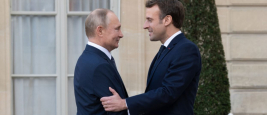Russia’s assault on Ukraine not only changed the contours of world geopolitics; it deeply affected the fabric of Russian society, provoking a massive exodus of self-made and independent-minded people from the country.

Russia / Eurasia

Post-Soviet Russia has gradually asserted itself as an imperial and anti-Western power, representing a threat to the independence of its Eurasian neighbors, as well as to the post-Cold War international order. The Kremlin’s invasion of Ukraine on February 24, 2022 is the culmination of this behavior, with both regional and global consequences. Now cut off and isolated from the Euro-Atlantic space, Russia is seeking to deepen its partnership with China and to turn towards non-Western worlds, especially in Asia and Africa. In the Eurasian space, historically dominated by Russia, the war amplifies centrifugal tendencies. The speed and depth of the transformations underway require constant and precise monitoring of the internal and external policies of the countries in the area.
Founded in 2005 at Ifri, the Russia/Eurasia Center produces research and organizes debates on Russia, Eastern Europe, Central Asia and the South Caucasus. Its objective is to understand and anticipate the evolution of this complex and rapidly changing region in order to enrich the public debate in France and Europe, and to assist in strategic, political and economic decision-making. Over time, the Russia/Eurasia Center has developed a network of contacts from institutions and civil society in the countries of the Eurasian space, and has established multiple partnerships with research institutes in Europe and around the world.
The digital collection Russia.Eurasia.Visions (formerly Russia.Nei.Visions), published by the Center, has become a reference point, with articles published in three languages (French, English and Russian). Relying on a network of leading experts and promising young researchers, it offers original analyses intended for public and private decision-makers, researchers, as well as for a wider public interested in the area.
Director of Ifri's Russia / Eurasia Center
...Research Fellow, Russia / Eurasia Center
...Project Officer, Russia / Eurasia Center
Associate Research Fellow, Russia / Eurasia Center
...Associate Research Fellow, Russia / Eurasia Center
...Associate Fellow, Russia / Eurasia and Geopolitics of Technologies Centers
...Associate Fellow, Russia / Eurasia Center
...Maia Sandu, who was elected President of the Republic of Moldova by direct universal suffrage in November 2020, won a large parliamentary majority in the snap parliamentary elections held in July 2021. Her plan for the internal transformation of Moldova is closely linked to her...
The traditional and high-intensity war that has occurred in Ukraine since Russia decided to invade raises a key issue: did post-soviet Russian strategic thought really prepare Russia for waging this war?
2022 saw the climax so far of the weaponization of energy. Following its geopolitical demise, Russia has undertaken its own gas amputation, moving from a super energy power status to a diminished role with uncertain prospects and only hard options left.
In addition to being a leading gas and oil power, Russia also possesses vast geological resources that place it among the world’s leading mining countries.
The chaotic retreat of the United States from Afghanistan in August 2021 might lead to an expectation of a lasting loss of influence in central Asia.
When Xi Jinping and Vladimir Putin announced a “no limits friendship” at their February 2022 summit, the message was that Beijing and Moscow had reached a new peak in relations.
The overwhelming majority of the Russian population, having been fed Kremlin propaganda for years, approves of the war in Ukraine.
While Russia’s military invasion of Ukraine has resulted in a decoupling with the West on a scale not seen since the worst years of the Cold War, Russia has not been isolated from the non-Western world and has even reinvested its diplomatic energy toward the Global South.
China-Russia cooperation in space has been increasing for the past two decades. This cooperation accelerated after the Crimea crisis in 2014 and culminated with the announcement in 2021 of the joint construction of the International Lunar Research Station (ILRS).<...>
Russia-US: What Perspectives after Joe Biden’s Election? Videoconference
After four years of a Trump presidency marked by “Russiagate”, the election of Joe Biden at the end of 2020 marks a new turning point in Russian-American relations. While the change in the American administration allowed the New START treaty on strategic arms reduction to be saved in...
European security: from words to deeds - lessons from the Franco-Danish partnership Visioconférence
Global power competition, growing unpredictability, mounting military pressures, hybrid threats and the persistence of terrorism... Europe is now facing a deterioration of its strategic environment.
...
From Navalny to Biden: the Multiple Fronts of President Putin Les Jeudis de l'Ifri
A "Les Jeudis de l'Ifri" videoconférence around Tatiana KASTOUEVA-JEAN,...
The European space sector in a context of international competition Webinar
The access to space sector is no longer limited to the historic pioneers of the space adventure nor to the sole states. Exploration projects stimulate imagination and national narratives and trigger important investments in ambitious innovative projects.
Rethinking the EU-Russia relationship after Borrell’s Moscow visit or: How to deal with Russia after Borrell’s visit to Moscow Videoconference
The EU-Russia relationship, which has been deteriorating since 2014, has recently experienced various shocks, such as the poisoning, then imprisonment of opposition leader Alexey Navalny and the failure of EU High Representative Josep Borrell’s diplomatic visit to Moscow. Judging by Russian...
Russia in the Triple Storm: Constitutional Reforms, Economic Crisis, Pandemic Management Les Jeudis de l'Ifri
A "Les Jeudis de l'Ifri" videoconference around Tatiana KASTUEVA-JEAN, Director of Ifri's Russia / NIS Center.
Russia’s thwarted ambitions By personal and non-transferable invitation
This event is dedicated to the Russia/NIS Centre Corporate supports. By personal invitation only.
...
QUAD 2019 Annual Meeting, London
Since 1983, the QUAD gathers every year, the SWP, RAND Corporation, Chatham House and Ifri. The QUAD was set up during the Euromissile crisis and brings together European and American diplomats, military officers, journalists and research fellow to debate on current geopolitical issues....
Division or Reconciliation: The Changing Political Agenda and Role of Think Tanks in the Next Decade? Council of Councils Twelfth Regional Conference
The 12th regional conference of Council of Councils (CoC) will take place at Ifri from November 17 to 19, 2019. An initiative of the Council on Foreign Relations, the CoC strives to define major foreign policy challenges by...
Russia’s power: instruments and dilemmas By personal and non-transferable invitation
This event is dedicated to the Russia/NIS Centre Corporate supports. By personal invitation only.
...Kyiv expects new recruits to appear within two months but Moscow struggles with training and logistical obstacles.
Following the last Ukrainian victories over the Russian Army in the Kharkiv oblast, Russian administration currently faces controversies. As a matter of fact, many question the degree of intensity Russian general staff has decided, avoiding for now general mobilization. According to Dimitri...
As elections approach Sunday, the far-right candidate is linked to the Russian president by a web of financial ties and a history of support that has hardly dimmed despite the war in Ukraine.
Since the beginning of the Russian invasion, the port city of Mariupol, located on the Sea of Azov, has been of great strategic interest to Moscow. Vladimir Putin has made it a symbolic objective.
Renault had for months been plotting to export a newfangled version of the Lada to the reste of the world. although realising that ambition remained some way off, it would have capped the revival of a brand arguably more synonymous with the Soviet Union than any other and which Renault first...
Officials in Beijing believe it can take advantage of a distracted US and weakened Russia. The war in Ukraine is far from over, but a consensus is forming in Chinese policy circles that one country stands to emerge victorious from the turmoil: China.
...In January 2022 Kazakhstan underwent its most serious political crisis since its independence, proclaimed on December 16, 1991. The increase in the price of fuel has set ablaze the west of the country in the grip of socio-economic marginalization, then the southern regions, traditionally more...
Data on the concentration of Russian troops was solid; the diplomatic offensive executed by Moscow was deliberately disagreeable; yet, many experts (myself including) refused to accept the proposition on the coming war as “inevitable”.
Western powers appear unable to thwart Putin’s strategy to reassert Russian influence
Rarely in recent years has the Kremlin been so popular with European visitors. French President Emmanuel Macron arrives Monday. The Hungarian prime minister visited last week. And in days to come, the German chancellor will be there, too. All are hoping to get through to President Vladimir...



